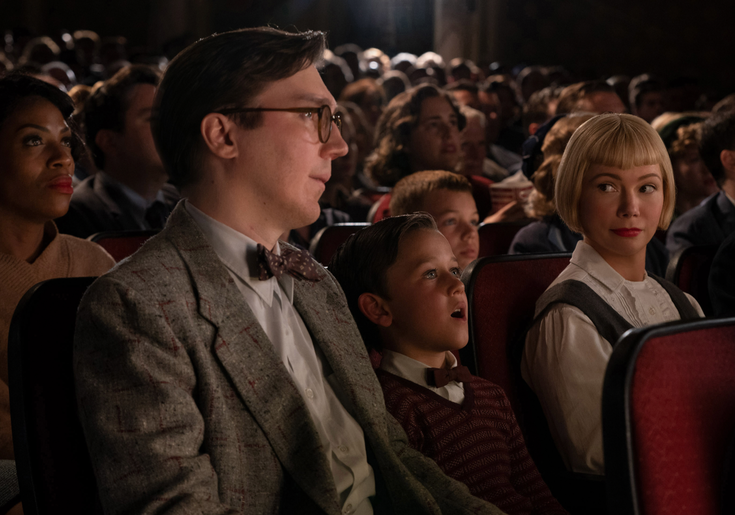For decades, in interviews, Steven Spielberg spoke slightingly of his father Arnold. He said his father had never shown him affection, and "I don’t want to repeat that error. I know that I always felt my father put his work before me. I always thought he loved me less than my work, and I suffered as a result." Since Arnold lived a very long time, he likely read this quote and many, many others like it over the course of his son’s astonishing five-decade career.
Arnold also surely saw every picture his son made, which meant he had to watch as Spielberg presented the cinema with a rogue’s gallery of lousy fathers—fathers who literally leave their kids on earth to travel to the stars (Close Encounters of the Third Kind), or go off to Mexico with their girlfriends (E.T.), or are unpleasantly impatient (Hook), or deeply ungenerous emotionally (Indiana Jones and the Last Crusade).
When E.T. became the most successful movie ever made in 1982, Spielberg spoke frequently about how it was a metaphorical autobiography. In so doing, he gave the impression that Elliott’s father—who dumped his wife before the movie begins—was a stand-in for his own. Meanwhile, he publicly showered his saucy and sassy mother Leah with love. He set her up in a kosher dairy restaurant in Los Angeles (it was excellent, by the way) and called her his "lucky charm" in his Oscar speech when he won for Schindler’s List. That night, he did not mention his father at all.
Now, at the age of 74, he has decided to correct the record. He has just co-written and directed The Fabelmans, an autobiographical picture that is nothing less than an act of contrition. You might call it his Mourner’s Kaddish. Jews recite a prayer called the Mourner’s Kaddish three times daily for a year after a member of their immediate family passes. The Fabelmans began filming within a year of Arnold’s death at the age of 103. It is Spielberg’s Kaddish.
The distant father Spielberg spoke about in interviews is not the father we see in The Fabelmans. Bert, played by Paul Dano, is patient and kind and forgiving and a source of family stability. He is supportive of his son’s interest in filmmaking but would prefer he pursue a career making and doing tangible things, which is portrayed here not as a dismissal of his son’s abilities but as a reasonable paternal point of view. We are also told that he is a genius (Arnold Spielberg was a pioneer in the commercial application of computers and held 12 patents) and that some of the difficulties in his marriage are due to the fact that his wife Mitzi feels unequal to him. He does what he can to mitigate that problem by being a loving and devoted husband, which isn’t easy, because his wife Mitzi Fabelman is not exactly loving and devoted back.
If The Fabelmans is a sentimental love letter to Spielberg’s father, the tone is quite different when it comes to his mother. Mitzi is the unstable center of The Fabelmans, suffering from undiagnosed bipolar illness (the movie is set between the years 1952 and 1966) and trying to hold herself together while her own existential desperation keeps her teetering on the verge of breakdown. That his mother suffered from mental illness is new information Spielberg provides us with here to understand him. And why shouldn’t it be new? His mother only died in 2017 and surely he wanted to spare her any public embarrassment. But since he has made her condition our business by making this movie, it’s worth noting that The Fabelmans lays the blame for the central trauma of his life—the dissolution of his nuclear family—entirely at the feet of his mother.
Spielberg’s revision of his own personal myth is the only reason I can discern for the existence of The Fabelmans. It’s a strange picture, because there’s very little urgency to it, and for good reason. The story of the early struggles of a person who became the most successful director in history almost from a standing start in his mid-20s with Jaws—and began his career by signing a contract with Universal Studios as a director at the age of 21—just isn’t going to have much meaningful drama to it.
Sure, his parents fought—although in this movie, there isn’t actually much fighting, while biographies of Spielberg suggest Arnold and Leah were unpleasant to each other for six years before they split. And sure, when he moved to a new high school in Northern California six months before his graduation, he found himself crosswise of some horrible anti-Semite jocks. The only real surprise in the movie, which I don’t want to spoil, involves his father’s best friend (Seth Rogen, in the movie’s standout performance). The only real interest the movie generates comes from watching Spielberg’s stand-in, Sammy, begin to make movies at the age of 6 and achieve preternatural mastery by the time he reaches 15. A sequence in which he films a World War II story with classmates from his Phoenix high school is simply stunning. Spielberg is too old and too grand at this point to be falsely modest; The Fabelmans is unabashedly the story of the coming of age of a great popular artist.
The way the movie shows us Sammy’s discovery of his gifts is spellbinding. And it’s mostly done silently, which is a good thing, because the dialogue by Spielberg and Tony Kushner is often nothing short of ghastly. Funny thing. Spielberg also collaborated with Kushner on West Side Story last year, which was a fluid and inventive masterpiece. Here he tells his own story to far more indifferent results. I wish I could say The Fabelmans deserves its current standing as the frontrunner for this year’s Oscars, because it’s a serious and honorable piece of work and it is, of course, beautifully made. It’s just not very good.
